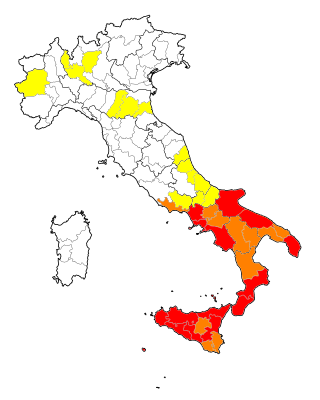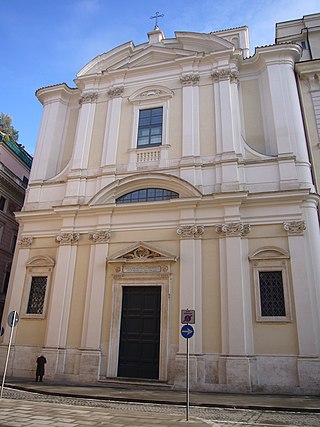
The properties of the Holy See are regulated by the 1929 Lateran Treaty signed with the Kingdom of Italy. Although part of Italian territory, some of them enjoy extraterritoriality similar to those of foreign embassies, including tax exemptions. Those living within these properties are still required to obtain the legal documents necessary to live in the host country. For example, American seminarians at the Pontifical North American College must have an Italian visa, despite both living and studying in extraterritorial properties of the Holy See.

Emanuela Orlandi was a Vatican teenager who mysteriously disappeared while returning home from music school in Rome on 22 June 1983. The case received worldwide attention due to the public appeal of Pope John Paul II for her release after an unnamed terrorist organisation claimed to be holding the girl in exchange for the liberation of Mehmet Ali Ağca, the Turkish terrorist who two years before attempted to assassinate the Pope. However, the subsequent investigation discovered that the allegation of international terrorism was a misdirection, and the real motive of the disappearance remains unknown.

Criminal organizations have been prevalent in Italy, especially in the southern part of the country, for centuries and have affected the social and economic life of many Italian regions. There are major native mafia-like organizations that are heavily active in Italy. The most powerful of these organizations are the Camorra from Campania, the 'Ndrangheta from Calabria and the Cosa Nostra from Sicily.
The Banda della Magliana was an Italian criminal organization based in Rome. It was founded in 1975. Given by the media, the name refers to the original neighborhood, the Magliana, of some of its members.
Mirella Gregori mysteriously disappeared from Rome on 7 May 1983, about forty days before the disappearance of Emanuela Orlandi, a citizen of Vatican City. Both vanishings are unsolved as of today.

The Basilica di Sant'Apollinare alle Terme Neroniane-Alessandrine is a titular church in Rome, Italy, dedicated to St Apollinare, the first bishop of Ravenna.

The Nuclei Armati Rivoluzionari, abbreviated NAR, was an Italian neo-fascist armed militant organization active during the Years of Lead from 1977 to November 1981. It committed over 100 murders in four years, and had planned to assassinate the politicians Francesco Cossiga, Gianfranco Fini and Adolfo Urso. The group maintained close links with the Banda della Magliana, a Rome-based criminal organization, which provided such logistical support as lodging, false papers, weapons, and bombs to the NAR. In November 1981, it was discovered that the NAR hid weapons in the basements of the Health Ministry. The first trial against them sentenced 53 people in May 1985 on charges of terrorist activities.

Romanzo criminale is an Italian-language crime drama film released in 2005, directed by Michele Placido. It was highly acclaimed and won 15 awards. It is based on Giancarlo De Cataldo's 2002 novel, which is in turn inspired by the true story of the Banda della Magliana. The Magliana gang was one of the most powerful Italian criminal associations, dominating Rome's drug, gambling and other kinds of crime activities from the early 1970s until the death of Enrico De Pedis in 1992. The gang's affiliates started their career kidnapping rich people, drug dealing. From the 1970s they started working with the Italian secret service, fascists, terrorists, the Sicilian Mafia, the Camorra, and many more. Some gang members are still alive, as inmates of an Italian prison, or justice collaborators.

Mauro De Mauro was an Italian investigative journalist. Originally a supporter of Benito Mussolini's Fascist regime, De Mauro eventually became a journalist with the left-leaning newspaper L'Ora in Palermo. He disappeared in September 1970 and his body has never been found. The disappearance and probable death of the "inconvenient journalist", as he became known as a result of his investigative reporting, remains one of the greatest unsolved mysteries in modern Italian history.
This is an index of Vatican City–related topics.
Romanzo criminale is an Italian novel written by the judge Giancarlo De Cataldo and inspired by the true story of the Banda della Magliana, a criminal gang which operated in Italy in Rome between the late 1970s and mid-1980s. The novel, published by Einaudi, formed the basis for the movie of the same name (2005) directed by Michele Placido and for a TV series directed by Stefano Sollima.

Francesco Montanari is an Italian actor.

The Church of San Pellegrino in Vaticano is an ancient Roman Catholic oratory in the Vatican City, located on the Via dei Pellegrini. The church is dedicated to Saint Peregrine of Auxerre, a Roman priest appointed by Pope Sixtus II who had suffered martyrdom in Gaul in the third century. It is one of the oldest churches in the Vatican City.

Romanzo criminale – La serie is an Italian television series based on the novel of the same name by the judge Giancarlo De Cataldo. The series is an adaptation of the film Romanzo Criminale (2005) directed by Michele Placido. The first series quickly achieved cult status in Italy.

The Teutonic Cemetery is a burial site in Rome adjacent to St. Peter's Basilica. Burial is reserved for members of the Confraternity of Our Lady of the German Cemetery, which owns the cemetery. It is a place of pilgrimage for many German-speaking pilgrims.
Massimo Carminati, referred by the press as one of "the kings of Rome", and in the context of the onset of the "Mafia Capitale" investigation nicknamed as il Cecato, is an Italian underworld figure and former member of far-right terrorist group Nuclei Armati Rivoluzionari and criminal gang Banda della Magliana, which were at the centre of sensational allegations of state collusion and Masonic conspiracy during Italy's Years of Lead. Carminati was investigated for match fixing in 2012. In 2014 he was arrested with 36 others on allegations of running a corrupt network that infiltrated Rome's public administration. He was charged with fraud, money laundering, embezzlement, and the bribing of public officials. In 2017, Carminati was sentenced to 20 years in jail. In 2020, he was released due to the expiry of his pre-trial detention terms.

Franco Giuseppucci was an Italian criminal, and one of the founders and bosses of the Banda della Magliana, an Italian criminal organization based in the city of Rome that was particularly active throughout the late 1970s until the early 1980s.
Manlio Vitale is an Italian criminal and high-ranking member of the Banda della Magliana, an Italian criminal organization based in the city of Rome. He is known as "Er Gnappa", which is Romanesco for "short person".

Maurizio Abbatino is a former Italian criminal, one of the original bosses of the Banda della Magliana, an Italian criminal organization based in the city of Rome, particularly active throughout the late 1970s until the early 1990s. He became a pentito, a collaborator with justice after his arrest in 1992.

Alessandro Roja is an Italian film, television, and stage actor.














